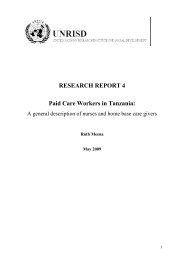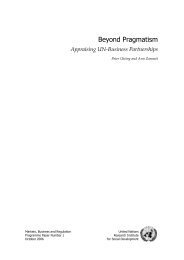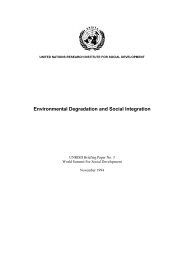communicating in the information society - United Nations Research ...
communicating in the information society - United Nations Research ...
communicating in the information society - United Nations Research ...
Create successful ePaper yourself
Turn your PDF publications into a flip-book with our unique Google optimized e-Paper software.
Introduction<br />
eye on <strong>the</strong> question of which <strong>in</strong>formation <strong>society</strong> we are build<strong>in</strong>g, and<br />
who will benefit most from it.<br />
The contributions range from practical, down-to-earth advice on<br />
concrete implementation of an <strong>in</strong>formation <strong>society</strong>, through strategies to<br />
enrich <strong>the</strong> potential of WSIS, to philosophical rum<strong>in</strong>ations on <strong>the</strong><br />
etymology of <strong>the</strong> central concepts. They all, <strong>in</strong> one way or ano<strong>the</strong>r,<br />
support <strong>the</strong> idea that <strong>the</strong> process of <strong>communicat<strong>in</strong>g</strong> must be at <strong>the</strong> centre<br />
of an <strong>in</strong>formation <strong>society</strong>.<br />
The book beg<strong>in</strong>s, quite deliberately, not at <strong>the</strong> lofty end of <strong>the</strong><br />
discussion but with some very practical and down-to-earth analysis and<br />
advice on priorities <strong>in</strong> implement<strong>in</strong>g an <strong>in</strong>formation <strong>society</strong>, relevant no<br />
matter how we conceptualize it. Dafne Sabanes Plou and William<br />
McIver, Jr., focus on two groups of users who are absolutely critical to<br />
design<strong>in</strong>g and implement<strong>in</strong>g an <strong>in</strong>formation <strong>society</strong> that empowers<br />
<strong>in</strong>stead of divides, and whose needs and potential are so often ignored:<br />
women and local communities. Nei<strong>the</strong>r group is particularly attractive to<br />
commercial <strong>in</strong>terests, yet <strong>the</strong> extent to which <strong>the</strong>ir needs are addressed<br />
and <strong>the</strong>ir potential realized is probably as good a measure as any of <strong>the</strong><br />
s<strong>in</strong>cerity of claims for an <strong>in</strong>clusive <strong>in</strong>formation <strong>society</strong>. Build<strong>in</strong>g on <strong>the</strong><br />
Beij<strong>in</strong>g Platform for Action, Sabanes Plou makes <strong>the</strong> case for gender<br />
ma<strong>in</strong>stream<strong>in</strong>g <strong>in</strong> WSIS. Failure to act positively will replicate exist<strong>in</strong>g<br />
problems <strong>in</strong> emerg<strong>in</strong>g spheres, fur<strong>the</strong>r embedd<strong>in</strong>g discrim<strong>in</strong>ation and<br />
exclusion. McIver lays down <strong>the</strong> pr<strong>in</strong>ciples and practice of “community<br />
<strong>in</strong>formatics”, concerned with <strong>the</strong> design, deployment and management of<br />
<strong>in</strong>formation systems by communities <strong>the</strong>mselves, designed to solve <strong>the</strong>ir<br />
own problems.<br />
Light is cast on <strong>the</strong> media bl<strong>in</strong>d-spot <strong>in</strong> two very different but<br />
complementary contributions, underl<strong>in</strong><strong>in</strong>g <strong>the</strong> powerful dynamic of<br />
“traditional media” and po<strong>in</strong>t<strong>in</strong>g to WSIS as an opportunity. James<br />
Deane and his co-authors offer a timely rem<strong>in</strong>der of that “o<strong>the</strong>r<br />
<strong>in</strong>formation revolution” <strong>in</strong> <strong>the</strong> countries and regions of <strong>the</strong> global South.<br />
The frequent funnell<strong>in</strong>g of debate on <strong>the</strong> <strong>in</strong>formation <strong>society</strong> <strong>in</strong>to <strong>the</strong><br />
development potential of <strong>the</strong> Internet ignores what has been happen<strong>in</strong>g<br />
<strong>in</strong> television, newspapers and radio, whose impact is more pervasive and<br />
potentially even more far-reach<strong>in</strong>g. Wrest<strong>in</strong>g control of much media from<br />
<strong>the</strong> clutches of self-perpetuat<strong>in</strong>g and oppressive governments has been a<br />
major positive development, weakened or swept aside by a media<br />
liberalization maelstrom that has wrought massive and deep change<br />
almost everywhere. Yet a new set of challenges, perhaps even more<br />
<strong>in</strong>tractable, is emerg<strong>in</strong>g as commercially driven media beg<strong>in</strong> to drown<br />
out or obstruct <strong>the</strong> emergence of public <strong>in</strong>terest media. Journalists and<br />
media activists, who have fought for years to escape government control,<br />
are rightly suspicious of government-led policy responses. Yet <strong>the</strong> need<br />
for action to place <strong>the</strong> public <strong>in</strong>terest at <strong>the</strong> centre is press<strong>in</strong>g—to do<br />
7
















